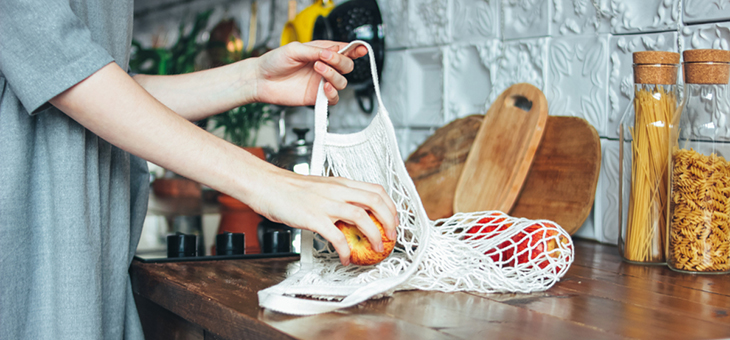Each year, 4.2 million tonnes of food waste goes to landfill in Australia and more than half of this comes from households. Experts say saving food waste can do more for the environment than switching off the lights.
On top of that, there’s the cost to your wallet. The average household throws away around $2000 worth of food each year, according to a 2013 survey of 1600 Victorian households. Nearly two-thirds of the food thrown away could have been eaten.
Read more: Innovative ways companies are tackling food waste
There’s nothing nice about food going off before you get around to enjoying it. So, if you’re tired of opening your fridge to find limp carrots and soggy lettuce, here’s what you can do about it.
Store onions in a pair of tights
Take a washed pair of used or new tights, place an onion into each foot and tie knots above. Repeat the process until both legs are full or you have run out of onions.
Hang the tights in a cool, dry, and dark place, such as a pantry, closet, or cellar.
If you don’t have any spare tights, just save a couple of mesh bags from onions, potatoes or other produce and use these. It’s not the material of the tights that helps, it’s the way they are stored separately with breathing space all around and not sitting on a surface.
Freeze spring onions
Who uses a big bunch of spring onions at once? Chop spring onions and drop them into a clean, dry plastic water bottle. Store it in the freezer and simply sprinkle the onions out when needed.
Just make sure the spring onions are completely dry before storing or they’ll get freezer burn.
Wash berries with a vinegar solution
Prepare a mixture of one-part vinegar (white or apple cider) and 10 parts water. Swirl the berries around in the mixture, drain, rinse, and put them in the fridge. The solution is diluted enough that you won’t taste the vinegar. Raspberries will last a week or more, and strawberries go almost two weeks without getting mouldy and soft.
Think about what you store in the fridge door
Opening and closing the fridge door can cause the average temperature to rise so you don’t want to keep your most perishable items here.
Dairy eggs, milk, butter, yogurt, cheese, sour cream should all go on the lower shelves to avoid fluctuations in temperature.
Put your least perishable items in the door, like ketchup, mustard, soy sauce and other condiments with longer shelf lives.
Store potatoes away from onions
Onions and potatoes can release moisture and gases that will cause the other to spoil faster. So keep them separate and store each in a cool, dry, well-ventilated place.
Never store potatoes in the fridge. The cold turns the potato starch into sugar.
If you buy potatoes in a plastic bag, make sure to remove them and place the potatoes in a cardboard box, paper bag, mesh bag, or basket to ensure good ventilation. Plastic bags won’t allow them to breathe and will shorten their shelf life considerably.
Remove any potatoes that are soft, shrivelled or sprouted so they don’t cause more to go bad. Even if your potatoes have sprouted, they are still safe to eat as long as they are firm to the touch and are not shrivelled.
Read more: Dishes to make with food on the turn
You can also store potatoes with apples to keep them from sprouting.
Use butter to prevent cheese hardening
The next time you fancy a piece of cheese, smooth a very thin layer of butter over the cut side. Then, store the remainder of your cheese in wax or parchment paper.
This isn’t anything new; cookbooks have recommended buttering cheese to preserve its consistency for a very long time. One of its earliest mentions is in the cookbook A New System of Domestic Cookery, which was written in 1842, but with the modern-day convenience of the refrigerator, this simple tip has fallen by the wayside.
You should reapply butter each time you cut the cheese.
Soft cheeses, such as mozzarella, ricotta and chevre, are much fresher than their aged counterparts and can spoil very quickly if they don’t have any added preservatives. For the most part, these cheeses should be kept sealed in their original containers.
Keep lemons and limes in the fridge
Even though they look great in a fruit bowl, lemons and limes will last longer in the fridge.
They should stay fresh for around a week at room temperature if kept out of bright sunlight; but for ideal storage, pop them in the crisper drawer of the refrigerator. This way, they should keep for up to a month.
Place tomatoes upside down
If the stem was removed before purchase, place the tomatoes upside down on a flat surface so air won’t seep into the small opening, which expedites ripening.
Tomatoes ripen quickly and should be eaten soon after they are purchased. For the freshest taste, keep unripe tomatoes outside the refrigerator. When they are fully ripe, though, put them in the refrigerator to extend their life.
Read more: Stuffed Tomatoes on Couscous
Puncture plastic produce bags
Most of us believe that our fruits and vegies stay ripe for longer when kept out of the air. But contrary to popular belief, our vegetables also need space to breathe, so storing them in airtight plastic bags, is not the way to go.
Poke holes in plastic produce bags or invest in some mesh bags to store produce in the refrigerator.
Where do you store your tomatoes? What other tips to do you have about extending the shelf life of food?
If you enjoy our content, don’t keep it to yourself. Share our free eNews with your friends and encourage them to sign up.

